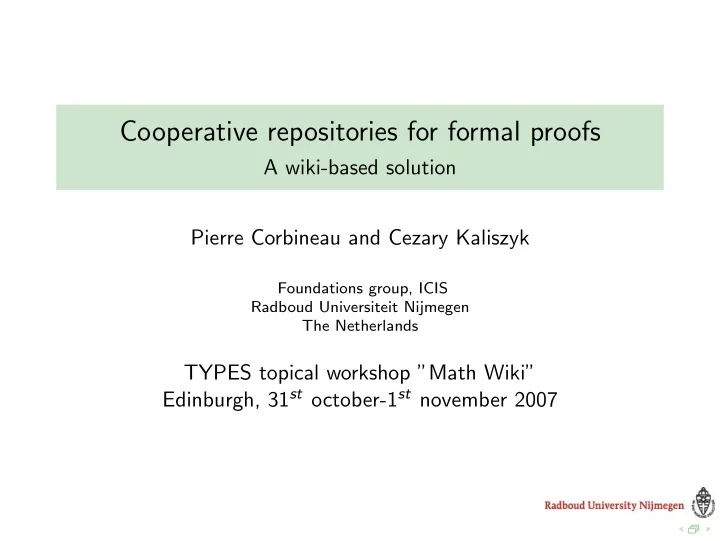

Cooperative repositories for formal proofs A wiki-based solution Pierre Corbineau and Cezary Kaliszyk Foundations group, ICIS Radboud Universiteit Nijmegen The Netherlands TYPES topical workshop ”Math Wiki” Edinburgh, 31 st october-1 st november 2007
Introduction Technology Consistency issues The ProofWiki prototype Conclusion
Why a library for formalized mathematics ? Proof assistants for: ◮ Software and system verification ◮ Formalized mathematics A proof assistant is nothing without a library of basic results. ‘There has to be somebody who already proved this !’ Different types of libraries: ◮ Base for new developments (standard library) ◮ Means of publishing new results
Online Math Libraries Non-formal examples: ◮ Mathworld and many others Semi-organized collections: ◮ Isabelle library (HTML rendering of summary only) ◮ Coq (standard library & contrib) (HTML rendered) ◮ documentation generators Organized collections: ◮ Mizar MML (Much bigger). ◮ Corn (also part of Coq contributions) Searchable databases: ◮ HELM Online systems: ◮ Logiweb (online PDF files)
Why a cooperative environment ? ◮ Formalizing mathematics is tedious ◮ We need more people involved ◮ We need more visibility (general public) ◮ Static online contents is not enough ◮ A cooperative environment creates a community ◮ Support for tutoring new users
The wiki architecture Wiki: ◮ Online content publishing framework ◮ Online content edition system Provides useful services: ◮ History management and (weak) version control ◮ Simple hyperlinks & math rendering (L A T EXvc) ◮ Discussion threads ◮ Reward: instant publication Clearly successful approach: ◮ Wikipedia, Wiktionary ◮ Specialized wikis for many software projects ◮ Wikis for research websites ...
Why a web interface for a proof assistant ? Proof assistants are: ◮ Difficult to install ◮ Greedy in resource usage Formal proofs: ◮ Hardly self contained ◮ Strong operational meaning ◮ What does this step do ? ◮ What are we proving here ? An interactive online interface brings: ◮ Immediate and easy access ◮ Help by observing the proof execution ◮ Possibility to modify and experiment ◮ Formal proving can be fun !
Towards a collaborative online repository for formal mathematics Combine: ◮ Community website ◮ Open access to formal proofs for the public ◮ Visible result for funding agencies ◮ Educational projects (undergraduate and master students) ◮ Development -suite for proofs ◮ Reference database (also with informal contents)
Introduction Technology Consistency issues The ProofWiki prototype Conclusion
The ProofWeb AJAX interface Developped by C. Kaliszyk. Supports different proof assistants: ◮ Coq, Isabelle, Lego ... Current use in education: ◮ Web Deduction project (RU Nijmegen, VU Amsterdam).
Embedding into a Wiki framework Edit mode View mode writable read-only flat proof text syntax highlighting, links special comments HTML documentation executable proofs executable proofs
Architecture
Practical issues Security: ◮ Access control policy ◮ Arbitrary code execution & DOS attacks Solutions used: ◮ Sandboxing ◮ Limit on session number and timeouts Bottleneck: ◮ Recompiling and updating dependencies ◮ Use of an asynchronous crawler
Introduction Technology Consistency issues The ProofWiki prototype Conclusion
Formal vs Informal repository Informal wiki: ◮ Dangling references ◮ Incomplete articles Formal wiki: ◮ Keep dependencies as accurate as possible Three consistency strategies ...
Dynamic dependencies Always depend on the latest version.
Dynamic dependencies Always depend on the latest version.
Dynamic dependencies Always depend on the latest version.
Dynamic dependencies Always depend on the latest version.
Dynamic dependencies Always depend on the latest version.
Static dependencies No modifications allowed.
Static dependencies No modifications allowed.
Static dependencies No modifications allowed.
Static dependencies No modifications allowed.
Static dependencies No modifications allowed.
Static dependencies No modifications allowed.
Colored dependencies A middle way ?
Colored dependencies A middle way ?
Colored dependencies A middle way ?
Colored dependencies A middle way ?
Colored dependencies A middle way ?
Colored dependencies A middle way ?
Colored dependencies A middle way ?
Colored dependencies A middle way ?
Colored dependencies A middle way ?
Colored dependencies A middle way ?
Colored dependencies A middle way ?
Colored dependencies A middle way ?
Colored dependencies A middle way ?
Introduction Technology Consistency issues The ProofWiki prototype Conclusion
Off the shelf components ◮ Prover: Coq ◮ Documentation generator: customized coqdoc ◮ Web interface: ProofWeb ◮ Wiki Codebase: Mediawiki (PHP-based)
Dataflow
Screenshot: Edit Mode
Screenshot: View Mode
Towards a more agnostic support of proof assistants
Introduction Technology Consistency issues The ProofWiki prototype Conclusion
Future Work ◮ Ad hoc architecture (easier to manage) ◮ More proof assistants ◮ Formal / non formal pages (several name spaces) ◮ Import / Export feature ◮ Implement dependency control ◮ Add links from Wikipedia and attract traffic
Recommend
More recommend